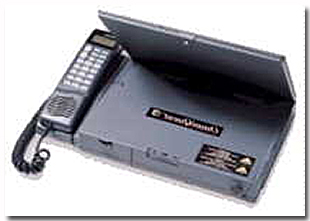|
|
 |
Knowledge Is Key
For Intelligent Decisions
Satellite Logic is a leading,
authoritative source of information in
the Satellite Industry. Located in the
heart of the Silicon Valley, Satellite
Logic provides one of the most
valuable and comprehensive
knowledge bases on the Satellite
market! This is a primary Worldwide
information center which enables our
clients to analyze, evaluate, inquire
and select their best tailored
solutions. Our company sets the
industry standards for targeted
buying leads, reflecting a dramatic
advance over traditional marketing
solutions.
|
|
|
 |

Inmarsat, the world's first global mobile satellite communications
operator, offers a mature range of modern communication services
to maritime, land-mobile, aeronautical and other users. Inmarsat
supports phone, fax, email, and data communications at up to 64kb.
Users include ship owners and managers, journalists and
broadcasters, health and disaster-relief workers, land transport
fleet operators, airlines, airline passengers, and air traffic controllers,
construction site workers, government workers, national emergency
and civil defense agencies, homeland security, peacekeeping forces,
business, and individual travelers.
Inmarsat is the grand-daddy of satellite phone service. It started
operations in 1979, and now has over ten different types of voice
and data service. Formed as a maritime-focused intergovernmental
organization over 20 years ago, Inmarsat has been a limited
company since 1999, serving a broad range of markets. With a
user base of 900 ships in the early 1980s, it now provides links for
phone, fax and data communications to more than 250,000 ship,
vehicle, aircraft and portable terminals. That number is growing at
several thousands a month. Inmarsat Ltd is a subsidiary of the
Inmarsat Ventures plc holding company. It operates a constellation
of geostationary satellites which comprises five third-generation
satellites backed up by four earlier spacecraft. Coverage is very
good, but doesn't extend all the way to the north or south poles,
and varies depending on which of their different services you might
subscribe to. However, most of these services are for commercial
users, and require large sized ground receivers. The most portable
is the Inmarsat Mini-M satellite service, which uses a briefcase
sized receiver unit weighing about 5.5lbs, and priced around $3000.

Inmarsat satellite phone service is acceptable for mariners and
other people who can accept a fixed mount 'base station' type
installation, but it is probably too bulky for people seeking a
convenient portable solution. And because it uses the high-altitude
geosynchronous satellites, conversations have the annoying
satellite delay/echo in them. The satellites are controlled from
Inmarsat's headquarters in London, which is also home to
Inmarsat Ventures as well as the small IGO created to supervise
the company's public-service duties for the maritime community
(Global Maritime Distress and Safety System) and aviation (air
traffic control communications). Inmarsat has regional offices in
Dubai, Singapore and India. The control teams in London are
responsible for keeping the satellites in position above the Equator,
and for ensuring that the onboard systems are fully functional at
all times.
Today's Inmarsat system is used by independent service providers
to offer a range of voice and multimedia communications. The
Inmarsat business strategy is to pursue a range of new
opportunities at the convergence of information technology,
telecoms and mobility while continuing to serve traditional
maritime, aeronautical, land-mobile and remote-area markets.
Keystone of the strategy is the new Inmarsat I-4 satellite system,
which from 2005 supports the Inmarsat Broadband Global Area
Network (B-GAN) - mobile data communications at up to 432kbit/s
for Internet access, mobile multimedia and many other advanced
applications. To deliver its services Inmarsat operates a worldwide
network of ground stations in addition to the satellite constellation.
Traffic from a user terminal passes via a satellite and then down to
a land earth station (LES), which acts as a gateway into the
terrestrial telecoms networks.
The NOC is supported by network co-ordination stations (NCS).
Their primary role is to help set up each call by assigning a
channel to the MES and the appropriate LES. There is one NCS for
each ocean region and for each Inmarsat system (Inmarsat A, B,
C, etc). Each NCS communicates with all the land earth station
operators in its ocean region, the other NCS and the NOC, making
it possible to distribute operational information throughout the
system.
|
|
|
|
